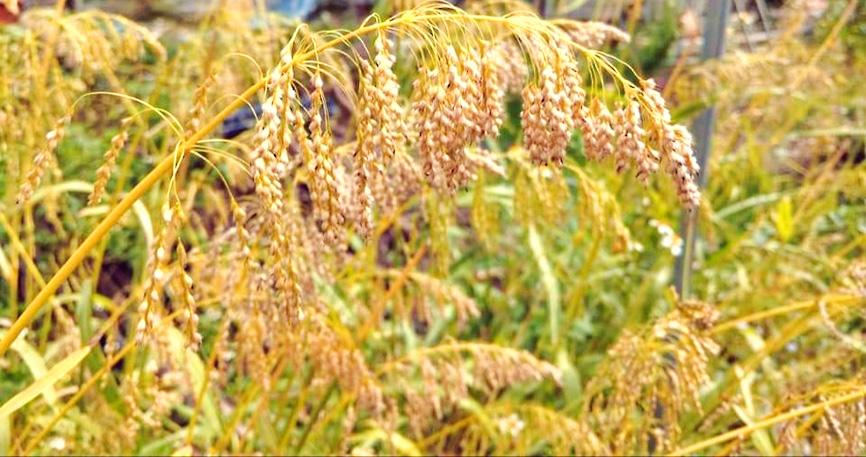Taiwanese oil millet, an endemic plant species, could be a superfood, providing high nutritional value to humans and livestock, Academia Sinica researcher Hsing Yue-ie (邢禹依) said yesterday.
Eccoilopus formosanus is extremely resilient, able to survive droughts, colds and salinized soil, said Hsing, who is also a professor of agronomy at National Taiwan University.
It is easier to grow than most major high-yield crops — such as rice, wheat, corn, cassava or sorghum — the production of which is reliant on heavy irrigation, herbicides and fertilization, but Taiwanese oil millet does not require that much effort, she said.

Photo: Chen Hsien-yi, Taipei Times
Some bed-and-breakfast owners in Taitung participating in her research used the plant and yeast used by Aboriginal cultures to make bread and bagels, which were widely favored by guests, she said.
Chiu Kuei-chun (邱貴春), a farmer who has grown Taiwanese oil millet for five years, said that the plant looks similar to wheat.
Bunun Aborigines mix it with crops such as quinoa, millet and rice, Chiu said.
It is a perennial crop that can yield three harvests per year, with each harvest lasting about a week, he said.
Despite its resilience, the plant can fall victim to birds, Chiu said, citing the first harvest of the crop on his farm this year.
Sparrows feeding on the plant resulted in an extremely low yield, he said.
Weeds are another risk factor, as young plants cannot compete with them, which makes weeding necessary, he said.
Hsing said that her research team is conducting extensive research on the plant in the hope that its special qualities could allow more applications.
For example, the team is developing a sunscreen based on the plant’s tolerance for salt, she said.

Taiwan has received more than US$70 million in royalties as of the end of last year from developing the F-16V jet as countries worldwide purchase or upgrade to this popular model, government and military officials said on Saturday. Taiwan funded the development of the F-16V jet and ended up the sole investor as other countries withdrew from the program. Now the F-16V is increasingly popular and countries must pay Taiwan a percentage in royalties when they purchase new F-16V aircraft or upgrade older F-16 models. The next five years are expected to be the peak for these royalties, with Taiwan potentially earning

STAY IN YOUR LANE: As the US and Israel attack Iran, the ministry has warned China not to overstep by including Taiwanese citizens in its evacuation orders The Ministry of Foreign Affairs (MOFA) yesterday rebuked a statement by China’s embassy in Israel that it would evacuate Taiwanese holders of Chinese travel documents from Israel amid the latter’s escalating conflict with Iran. Tensions have risen across the Middle East in the wake of US and Israeli airstrikes on Iran beginning Saturday. China subsequently issued an evacuation notice for its citizens. In a news release, the Chinese embassy in Israel said holders of “Taiwan compatriot permits (台胞證)” issued to Taiwanese nationals by Chinese authorities for travel to China — could register for evacuation to Egypt. In Taipei, the ministry yesterday said Taiwan

Taiwan is awaiting official notification from the US regarding the status of the Agreement on Reciprocal Trade (ART) after the US Supreme Court ruled US President Donald Trump's global tariffs unconstitutional. Speaking to reporters before a legislative hearing today, Premier Cho Jung-tai (卓榮泰) said that Taiwan's negotiation team remains focused on ensuring that the bilateral trade deal remains intact despite the legal challenge to Trump's tariff policy. "The US has pledged to notify its trade partners once the subsequent administrative and legal processes are finalized, and that certainly includes Taiwan," Cho said when asked about opposition parties’ doubts that the ART was

If China chose to invade Taiwan tomorrow, it would only have to sever three undersea fiber-optic cable clusters to cause a data blackout, Jason Hsu (許毓仁), a senior fellow at the Hudson Institute and former Chinese Nationalist Party (KMT) legislator, told a US security panel yesterday. In a Taiwan contingency, cable disruption would be one of the earliest preinvasion actions and the signal that escalation had begun, he said, adding that Taiwan’s current cable repair capabilities are insufficient. The US-China Economic and Security Review Commission (USCC) yesterday held a hearing on US-China Competition Under the Sea, with Hsu speaking on